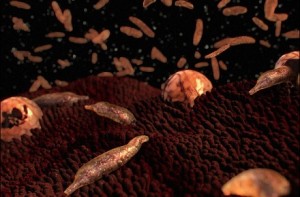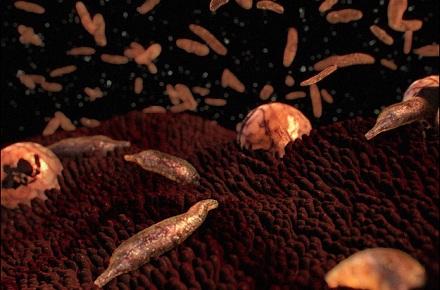The Health Protection Agency (HPA) can confirm it is investigating a recent increase in cases of the gastrointestinal infection, cryptosporidiosis, across four regions in England – the North East, Yorkshire, West Midlands and East Midlands.
 |
| [relatedPosts title=”Related Posts”] |
|
|
To date, 267 cases of cryptosporidiosis have been confirmed in the affected areas since 11 May 2012, compared to 73 cases across the four regions for the whole of May 2011.
The HPA is leading a multi-agency investigation to determine whether these recent cases are linked. So far investigations have not identified a possible source of infection and the distribution of cases suggests it is unlikely that public water supplies are implicated.
Cryptosporidiosis is caused by a tiny organism called Cryptosporidium, which is found in soil, food, water, or surfaces that have been contaminated with infected human or animal droppings. People can become infected by consuming contaminated water or food, by swimming in contaminated water, for example in lakes or rivers, or through contact with infected animals. The most common symptom is diarrhoea, which can range from mild to severe.
The majority of people who became unwell are known to be adults with slightly more females than males affected. Most people affected had a mild to moderate form of illness but a small number of people were hospitalised – all have now recovered.
Dr Stephen Morton, who is leading the investigation for the HPA, said: “It is usual to see an increase in cryptosporidiosis cases in the early summer, but, the increase is higher than we might expect so we are working with NHS partners, local Environmental Health Officers the Drinking Water Inspectorate and the Food Standards Agency to see if there is a common source of infection.
“GPs in affected areas have been informed about the recent rise in cases and asked to be vigilant to further possible cases. This is to ensure any further possible cases can be followed up as part of our investigations.
“If our investigations identify a common source, we will issue further health advice to the public as necessary.”
The best way to avoid cryptosporidiosis is to ensure thorough hand washing with soap and warm water before preparing and eating food, after handling raw food, after going to the toilet or changing a baby’s nappy and after contact with animals, particularly farm animals. In addition, people should not drink untreated water and avoid swallowing water in lakes and swimming pools.
Further Information
- Symptoms of cryptosporidiosis include watery diarrhoea, stomach pains, dehydration, weight loss and fever which could last for up to three weeks but can affect people with weak immune systems for longer.
- There is no specific treatment for cryptosporidiosis. Most people with a healthy immune system will recover within one month. It is important to drink plenty of fluids to avoid dehydration.
- Further information on cryptosporidiosis can be found here.
.





